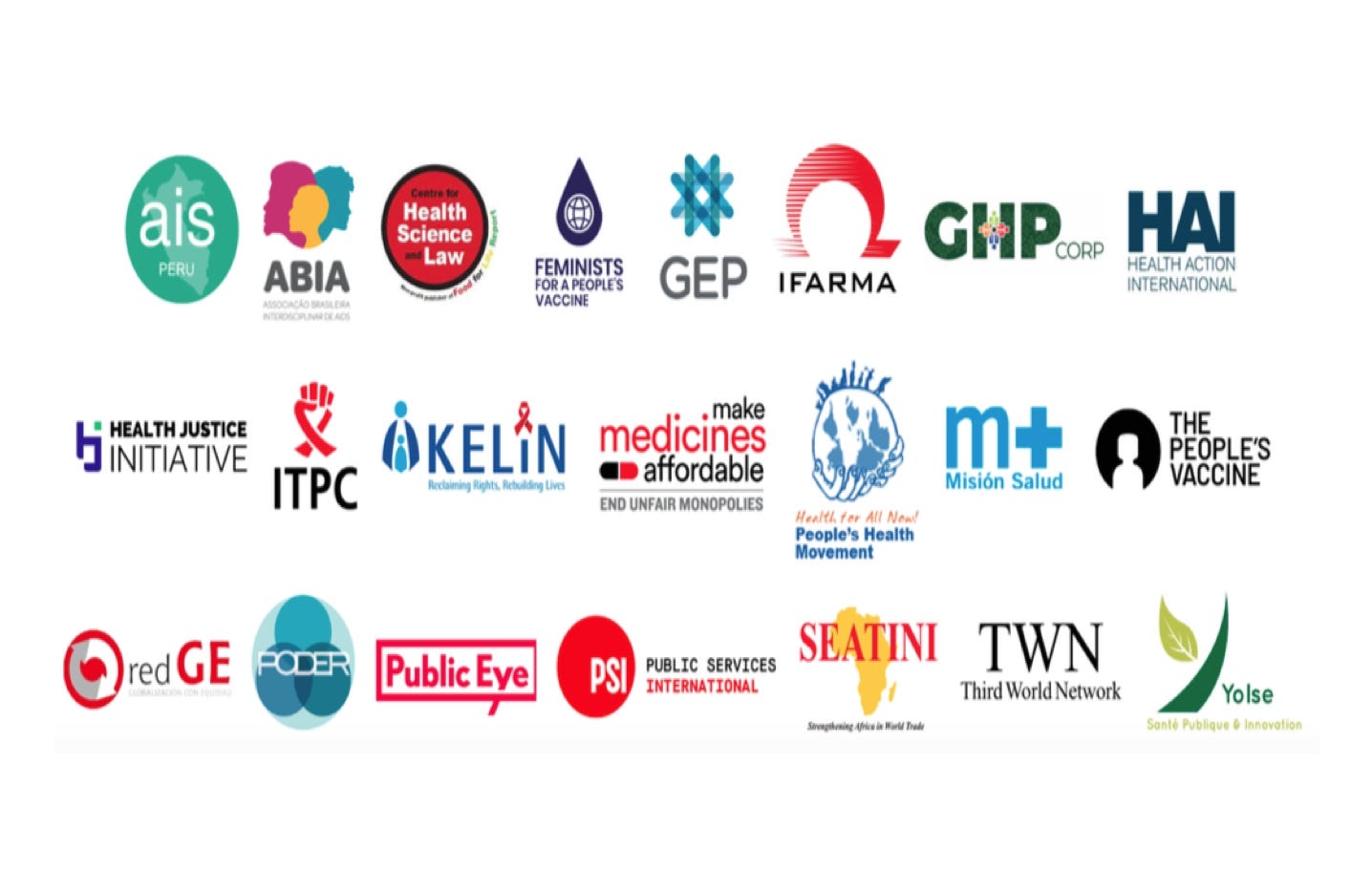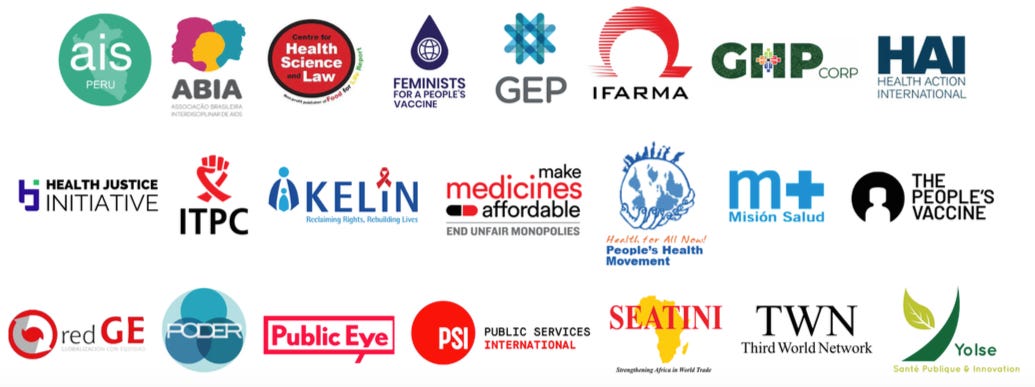"A Pandemic Instrument that Does Not Deliver on Equity is a Failure"
A number of organizations have published a joint statement voicing their concerns about the conduct and the status of the WHO negotiations. THESE NEGOTIATIONS MUST BE STOPPED IMMEDIATELY.
NOTE: I (James Roguski) am merely reporting this development. The joint statement below does NOT necessarily reflect my personal opinion regarding these matters. I do NOT necessarily agree with their joint statement below, but I do understand their dissatisfaction with the process.
In my opinion, the Intergovernmental Negotiating Body has been a very bad actor in these negotiations and something very nefarious has been going on throughout the negotiating process. This has truly NOT been a member nation led negotiating process.
It is also my opinion that the forces at work within these negotiations are far more likely to cause the negotiations to fall apart than anything being done by myself and/or other activists.
If we want the proposed agreements to NOT be adopted, it is vital that we comprehend what is really going on in these negotiations. We need to work with the forces and the people that are actually able to influence the outcome.
The old information, mis-information and mis-direction coming from “our side” is very detrimental to the cause.
A number of organizations have jointly published the statement below voicing their concerns about the conduct and the status of the WHO negotiations.
A Pandemic Instrument that Does Not Deliver on Equity is a Failure
27 April 2024
The resumed session of the Intergovernmental Negotiating Body (INB) meeting from 29 April to 10 May is expected to discuss yet another version of the Pandemic Instrument prepared by the INB Bureau and WHO Secretariat, with an ambitious target of “concluding the negotiations on the instrument” by 6 May.
The proposed process still does not allow WHO Member States to engage in effective text-based negotiations and, instead, forces them to engage in informal negotiations, especially with the Bureau and the WHO Secretariat. Such a process has so far failed to promote consensus on any part of the text. Instead, sometimes it resulted in pro-equity proposals advanced during informal sessions being omitted from the Bureau’s text while straining the capacities of smaller delegations to keep abreast of discussions.
The INB Bureau has recently conveyed that Member States’ textual/new wording proposals to the draft negotiating text will not be allowed, effectively making the Bureau’s document the default text. This leaves Member States to either take it or leave it, without any option of finding consensus among themselves. This pressurising tactic must be rejected and Member States should insist on Member State-led text-based negotiation to conclude a Pandemic Instrument that concretely addresses the status quo's lack of equity.
As May 2024 is approaching, there is tremendous pressure on Member States to conclude the negotiations at the earliest to facilitate the adoption of a Pandemic Instrument during the 77th Session of the World Health Assembly (WHA). This is, in turn, becoming a pressure on WHO Member States to either compromise, give up or postpone their equity demands especially on issues related to equitable access, technology transfer, a comprehensive multilateral access and benefit sharing system, and financing implementation of the instrument. At the same time, there are attempts to impose legally binding obligations on surveillance and information sharing with no provisions for financial and technological support to do so.
We, the undersigned organisations, strongly call upon Member States to resist such inappropriate pressure. While timelines are important for concluding the negotiations of the Pandemic Instrument, there is no value in having an instrument without concrete deliverables or enforceable provisions on equity, the absence of which reinforces the highly inequitable status quo.
The latest draft negotiating text fails to ensure predictable and sustainable access to pandemic-related products, technologies and finance and, at the same time, proposes onerous obligations on surveillance and One Health. The following provisions in the Pandemic Instrument are required to translate equity into reality and should be part of any text worthy of being adopted:
Equitable access
WHO mechanism for coordination and prioritisation of research and development on pandemic-related products based on scientific evidence.
A geographically diversified production network of pandemic-related products to supply at the regional /national level.
A mechanism for effective technology transfer coordinated by WHO to facilitate the sharing of technology and know-how to the geographically diversified production network and other facilities, to expand supplies in case of a surge in demand.
An obligation on Member States to transfer publicly funded pandemic-related product technology to the above-mentioned technology transfer mechanism coordinated by WHO.
A WHO database containing product specifications of pandemic-related products, by streamlining WHO's activities related to International Pharmacopeia and Vaccine Standardisation.
Unequivocal recognition of Member States right to temporarily suspend protection and/or enforcement of intellectual property to facilitate the local production and/or expedite supply of pandemic-related health goods.
Ensure procurement and distribution of pandemic-related products from the geographically diversified production network.
Health and care workforce
Legally binding assurances for decent work and social dialogue, as well as provisions to address disparities, inequalities, discrimination, stigma, and harassment of health and care workers. Though these provisions were part of the earlier draft, the current draft text has omitted these provisions.
Legally binding obligations to facilitate access of health workers to pandemic-related products on a priority basis to ensure an effective response. Pathogens Access and Benefit Sharing System (PABS)
An effective comprehensive PABS System treating both access and benefit sharing on an equal footing.
Facilitate the effective implementation of the PABS system by incorporating accountable systems that ensure all users of the system are identifiable, registered with WHO, and have agreed to legally binding terms and conditions as determined by Members including fair and equitable benefit-sharing commitments.
Fair and equitable benefit sharing to include both monetary and non-monetary benefits: (i) all users that financially benefit from using the PABS system must be required to make monetary contributions to WHO especially to build resilient health systems in developing countries; (ii) non-monetary benefits from users must include legal obligations applicable to public health emergencies of international concern (health emergencies) and pandemics: to make promptly available adequate supply of health products to address developing countries’ needs; to provide manufacturing licenses and share technology and know-how with developing country manufacturers to rapidly scale-up production to meet the surge in demand, to comply with WHO’s allocation mechanism, and to make available adequate supplies to affected countries to prevent health emergencies.
Finance
Creation of a fund for the implementation of the International Health Regulations 2005 (IHR) and pandemic instrument with obligations to provide financial resources to the fund based on the principle of common but differentiated responsibilities (CBDR).
Specify that financial reprogramming for pandemic prevention, preparedness and response should not divert or displace funds needed to ensure appropriate/sufficient labour conditions for health care workers, nor from basic health services financing, particularly comprehensive primary health care.
Role of WHO
List the specific roles of the WHO in the implementation of the Pandemic instrument and emphasize the need for accountability regarding its mandated functions in pandemic prevention, preparation, and response.
We call upon Member States not to succumb to the pressure and risk adopting a Pandemic Instrument which does not have legal obligations to ensure a sustainable and predictable supply of pandemic-related products, technology, and finance. We also strongly urge Member States to engage in the negotiations in good faith and ensure the incorporation of these crucial provisions in the Pandemic Instrument.
In solidarity,
Asociación Internacional para la Salud - AIS (Peru)
Brazilian Interdisciplinary AIDS Association - ABIA (Brazil)
Centre for Health Science and Law (Canada)
Feminists for a People's Vaccine campaign - FPV
Fundación Grupo Efecto Positivo - GEP (Argentina)
Fundación IFARMA (Colombia)
Global Humanitarian Progress Corp - GHP (Colombia)
Health Action International - HAI
Health Justice Initiative - HJI (South Africa)
International Treatment Preparedness Coalition - ITPC
Kenya Legal & Ethical Issues Network on HIV & AIDS - KELIN (Kenya)
Make Medicines Affordable Consortium
Misión Salud (Colombia)
People's Health Movement - PHM
People's Vaccine Alliance - PVA
Peruvian Network for a Globalization with Equity - RedGe (Peru)
Project on Organization, Development, Education and Research - PODER (Mexico)
Public Eye (Switzerland)
Public Services International - PSI
Southern and Eastern Africa Trade Information and Negotiations Institute - SEATINI
Third World Network - TWN
Yolse, Santé Publique & Innovation (Burkina Faso)
by James Roguski
The old system is crumbling, and we must build its replacement quickly.
If you are fed up with the government, hospital, medical, pharmaceutical, media, industrial complex and would like to help build a holistic alternative to the WHO, then feel free to contact me directly anytime.
JamesRoguski.substack.com/about
JamesRoguski.substack.com/archive
310-619-3055
All content is free to all readers.
All support is deeply appreciated.








If it slithers like a snake, hisses like a snake, has fangs and injects poison like a snake, then it is a snake!
Are we going to kill it?
Or try to turn it into a good snake?
What is a “pandemic”?
Have there been ANY “pandemics “ per that definition? Which were they?
Please define how the CONCEPT of “equity” applies to this situation .
Why on Earth would we ever need a “global” response to a “pandemic”?
I respect your work, James.